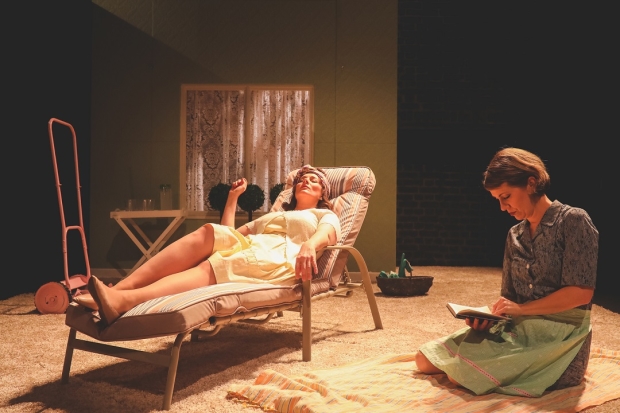Review: Eugene Onegin (Arcola)
OperaUpClose chooses 1960s England for its new version of Tchaikovsky’s romantic opera

© Andreas Grieger
The standards achieved by OperaUpClose grow richer by the year and in many respects this Eugene Onegin is the best work they’ve yet done. Lucy Bradley‘s production is intense and multi-layered, designs by Rosanna Vize are fresh and inventive, and the ten-strong cast is without exception exceptional. Moreover, cellist Alison Holford and violinist James Widden have created an artful reduction of the opera’s sweeping score for just four players: themselves plus piano and clarinet.
But it’s broken-backed. OUC’s artistic director Robin Norton-Hale has updated Tchaikovsky’s romantic opera to Britain in the 1960s and fitted it to a libretto of her own devising that has a strongly feminist slant. In so doing she has set herself a series of narrative hurdles that she surmounts with considerable ingenuity; but, crucially, while Pushkin’s tale survives, its essential scale is lost.
Lost, too, is the character of Prince Gremin, about whom more anon.
The opera starts smartly enough, set not on a Russian estate but in a suburban English garden that moves indoors with a satisfying flourish. However, once we reach the wrecking ball scene (here more a wrecking birthday party) the concept begins to crumble. A ball that replaces chandeliers and grandeur with finger food and small talk struggles to accommodate the cuckolding of Lensky, a good chap who loves the heroine’s sister but is driven to challenge his erstwhile friend Onegin to a duel (here a ‘fight’). The knife battle that ensues feels disproportionate: it's insufficiently motivated by past deeds and, with no urban gangs involved, not quite British.
Norton-Hale has bridled against letting the heroine Tatyana grow to become the trophy wife of an aging aristocrat so she makes her a successful novelist instead. This has entailed snipping her husband Prince Gremin from the opera altogether, and with him the touching aria he sings in the penultimate scene.
Not only is this excision musically regrettable, in Tatyana’s final rejection of Onegin it's dramatically catastrophic – because it removes her dedication to a higher cause than love. Instead, despite her feelings for Onegin she elects to live on her own terms. Plausible, yes, but hardly operatic.
Nevertheless, this Eugene Onegin deserves to give the Arcola its pre-Christmas rush. Visually it’s well realised, with proper snow and the cleverest floor in theatreland, and it boasts performances that range from solid to scintillating. Felicity Buckland is a feisty Olga, while Flora McIntosh does wonders with the underwritten character of Evie, aka Tchaikovsky’s Filipyevna, here no longer an ancient nurse but the youthful companion of Larina (Kathryn Hannah).
Principals are double-cast, and the trio I saw were red hot. Soprano Lucy Hall found all the juice in Tatyana’s letter scene while Felix Kemp‘s light baritone allowed him the freedom to express floods of natural emotion during Onegin’s descent from disdain to desperation. But it was Anthony Flaum who stole the bouquets. The tenor’s ringing accounts of Lensky’s arias had pathos, depth and truth, and many’s the singer who could learn from his accomplished body language. He made it easy to root for the underdog.
Eugene Onegin runs at the Arcola until 23 December.












